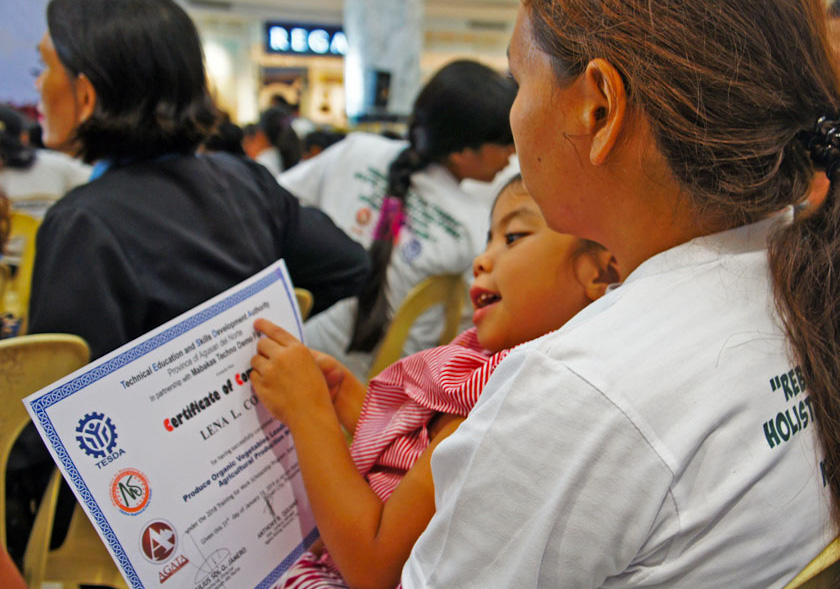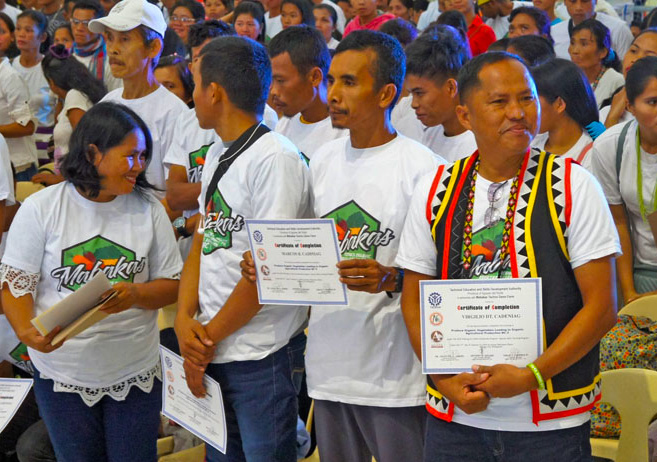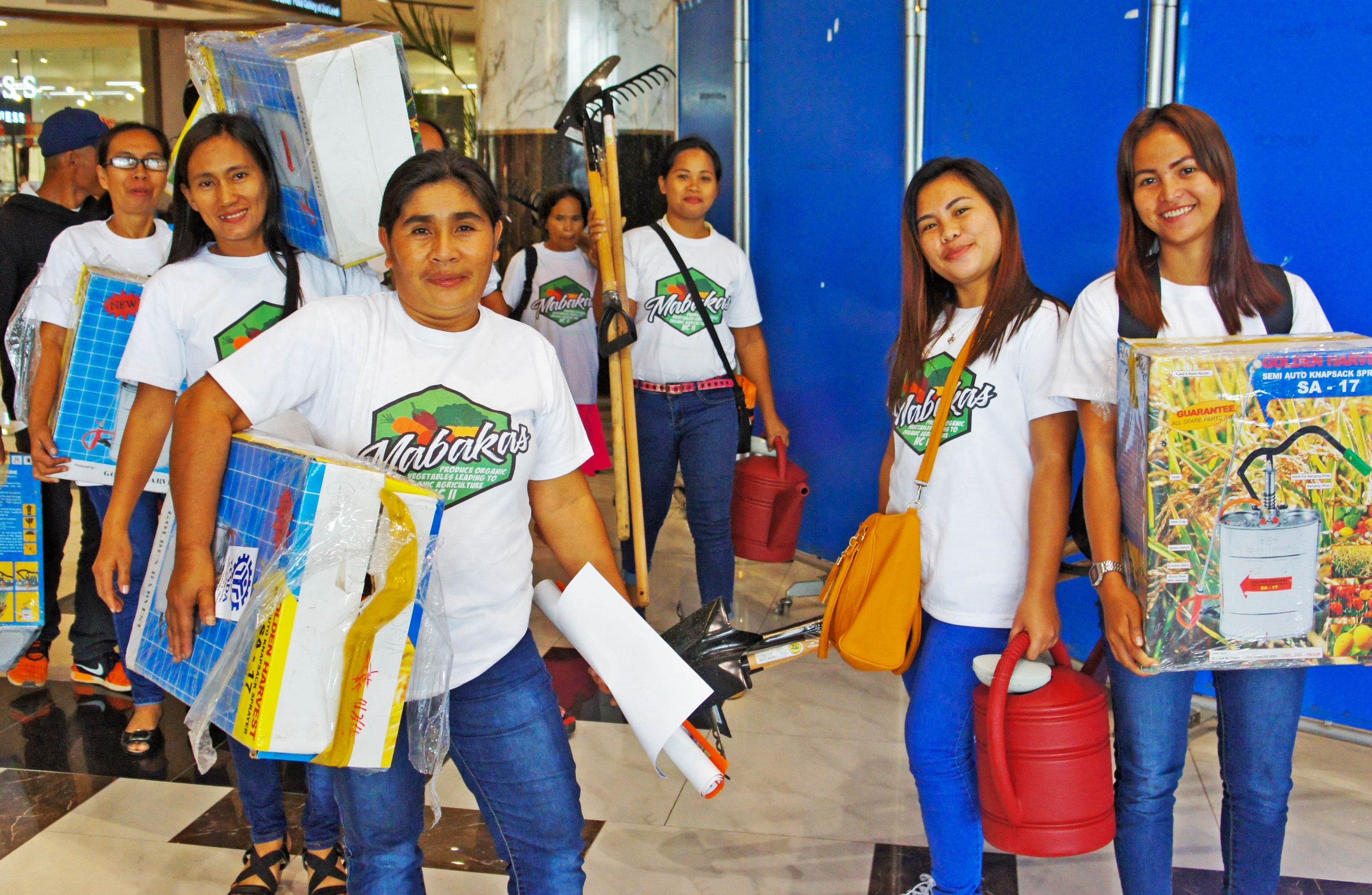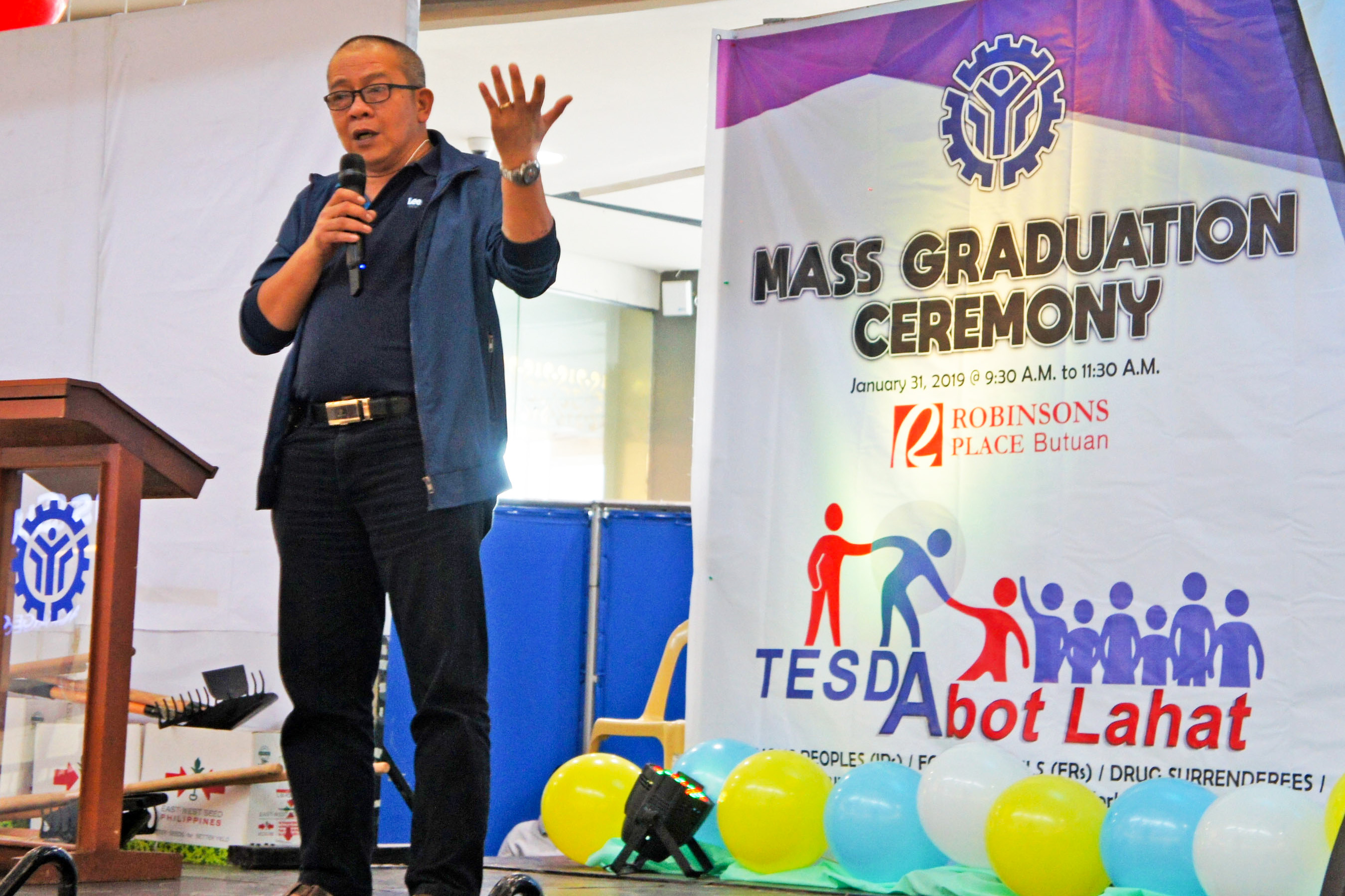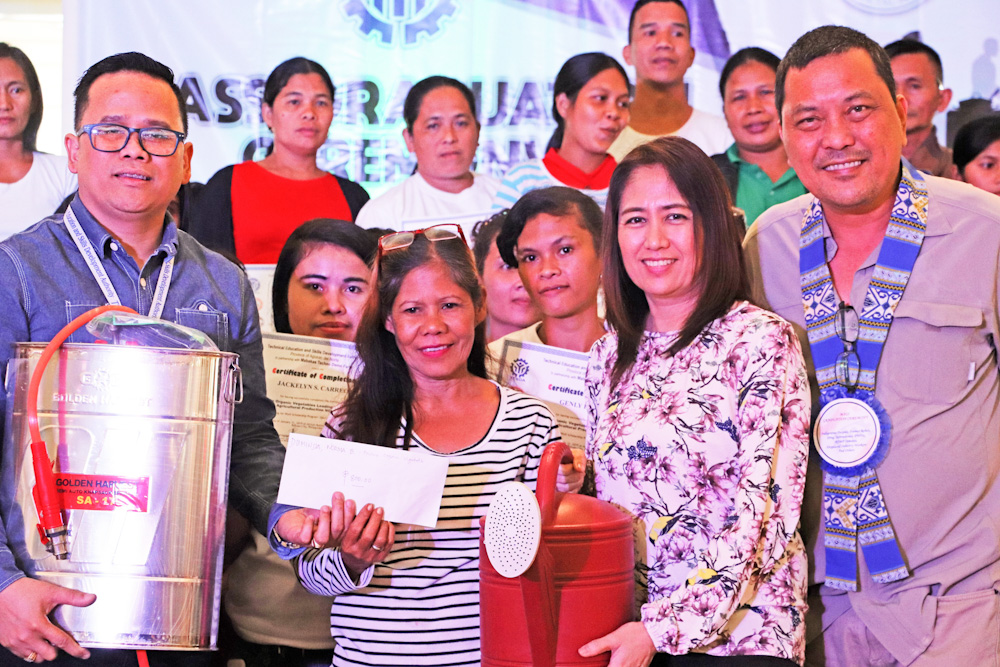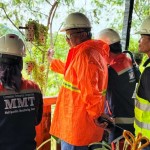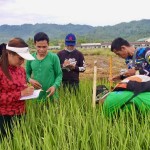-
Closer to communities. The joint TESDA-Agata “satellite trainings” bring skills closer to the communities and valuable livelihood opportunities closer to home. (In photo): A mother brings her child from their rural community to attend the graduation ceremony, taking pride in an opportunity for a more productive future.
-
Proud Mabakas Graduates. Higaonon Indigenous Peoples from Las Nieves show their Organic Farming NC II certificates. Their new skills enable them to provide sufficient healthy food on their tables through more productive and sustainable organic farming methods.
-
Women graduates with Organic Farming NC II certificates bring home new skills and sets of equipment for their farms.
-
To battle poverty. Deputy Director General for Communities and Local Government Unit Services Gaspar S. Gayona shares: “A TESDA NC II holder can apply in farm plantations, become instructors in TESDA’s programs, earn salaries – and more than that – become successful entrepreneurs in the future.”
-
Partners in uplifting agriculture. (Far Right): Agata Community Relations Superintendent Jonathan Bañez joins Agusan del Norte Provincial Board Member Elizabeth Marie Calo and TESDA Provincial Director Dr. Julius Sol O. Jamero in awarding certificates and farming equipment to female beneficiaries of the program.
Neighboring communities gain livelihood skills from the Agata-supported institution
Butuan City, Agusan del Norte, Philippines / March 2019 – The Agata-supported Mabakas Techno Demo Farm is the only organic farm school accredited by the country’s Technical Education and Skills Development Authority (TESDA) in the province of Agusan del Norte. Since its establishment in 2018, Mabakas has been the government’s partner in advancing food security and providing livelihood to rural agricultural communities.
The institution has so far provided organic farming courses to some 225 graduates from neighboring Las Nieves (145), Buenavista (19), and Nasipit (61) Municipalities – in addition to 130 graduates from Agata’s host communities.
In light of these achievements, TESDA recently staged a special graduation ceremony at Robinson’s Place Atrium in the Provincial Capital of Butuan City to culminate the students’ commencement and the success of their partnership with Agata, which volunteered its staff and resources for “satellite trainings” that bring skills closer to the communities.
Adding to the significance of the occasion are graduates from Indigenous People’s (IP) communities and rural barangays who are engaged in upland farming and vegetable production. Moreover, graduates include rebel returnees, former drug dependents, persons with disabilities, displaced industry workers and others under TESDA’s Special Skills Training Program.
Sustainable livelihood opportunities
The graduation ceremony was attended by TESDA Deputy Director General for Communities and Local Government Unit Services Dr. Gaspar S. Gayona III who shared the agency’s “great battle” in securing food and sustainable livelihood at the community level.
“A TESDA NC II holder can apply in farm plantations, become instructors in TESDA’s programs, earn salaries – and more than that – become successful entrepreneurs in the future. I sincerely commend Agata’s active presence in the field of organic farming where it strives to capacitate communities to provide opportunities other than the jobs available in mining,” said Dr. Gayona.
Mabakas presently has three poultry houses that are used as learning facilities for egg production – and which also earns monthly income from actual production, including food products supplied directly to Agata.
“Mabakas, and the opportunity to help other communities beyond the Agata MPSA, is the company’s legacy to all its rural farmers, fisherfolks and its indigenous hosts: the Mamanwas. This is our commitment to prove that there is responsible mining,” Agata Community Relations Superintendent Jonathan Bañez remarked during his speech.
At present, Agata’s IP communities have planted over 150 hectares with coconut, cacao, falcata, abaca, banana, coffee, fruit trees and corn. More than 200 families are also engaged in general merchandise (sari-sari stores) and livestock: hogs, goats, cattle, native chickens and carabaos.
Partnerships in Caraga
The establishment of Mabakas is the company’s long-term commitment to fostering sustainable livelihood and continuous development in its host municipalities – this, and a common progress shared with neighboring communities outside its 4,995-hectare Mineral Processing Sharing Agreement area.
Its banner program towards sustainability and the conception of Mabakas is a direct partnership with Jabonga Municipality – which utilized a former dump site and transformed it into a demo farm. Later on, TESDA and the Agricultural Training Institute (ATI) of the Department of Agriculture saw its potential and forged partnerships as well.
Mabakas presently has an in-house TESDA Assessor and a Cacao Specialist – and through the satellite training program – has served over 1,200 students who have undergone National Certificate I and II trainings in Organic Agriculture Production, Cacao Farming, Establishment and Rehabilitation of Cacao Plantations, School Staff Level Training for Agri-Crop and Organic Production.
The Villar Sipag Foundation, a non-government organization that provides access to livelihood, also helped in bridging the needed services between government agencies and Mabakas as well as the logistical support needed in conducting classes.
“I highly recommend the Mabakas Techno Demo Farm as the right facility to learn healthier and more sustainable organic farming. Furthermore, I highly appreciate the willingness of Agata’s management and personnel to go the extra mile in helping other communities outside its MPSA,” according to TESDA Provincial Director Dr. Julius Sol O. Jamero.
The joint TESDA-Agata satellite training program has gone as far as reaching the Higaonon Tribe of Mindanao, whose ethnic group is known to inhabit the mountains and thrive on traditional upland farming that they inherited from their ancestors.
“The areas we asked them (Agata) to help and assist are far-flung communities while most of the students are rebel returnees and indigenous people. Nonetheless, Agata did not step back from its commitment,” Dr. Jamero concluded.
*******

